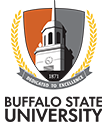Institutional Learning Outcomes
Graduates of Buffalo State University will be known for their:
I. Cultural fluency[i] - Graduates will be aware of how ideas are shaped by cultures and social norms and be able to engage with ideas different from or in conflict with their own; students will be aware of cultural, societal, and institutional factors influencing assumptions, prejudices, and privileges.
II. Urban engagement [ii] - Graduates, leveraging their experiences in Buffalo State’s distinctive urban setting, will understand how to interact meaningfully in their communities and possess the skills to be wise, productive, and responsible citizens.
III. Scholarship and creative activity [iii] - Graduates will possess the quantitative, conceptual, and creative skills to pose, frame, and analyze a range of questions, problems, and issues. They will produce complex and intellectually challenging work and demonstrate essential technological skills.
IV. Ethical reasoning [iv] - Graduates will deliberate ethical values and principles and apply them in ambiguous, complex, and controversial contexts. They will be conscientious persons, students, and professionals.
[i] Assessment model: Miville-Guzman Universality-Diversity Scale (M-GUDS-S) (short form)
[ii] Assessment models: Civic Engagement VALUE Rubric, Socially Responsible Leadership Scale (SRLS-R2)
[iii] Assessment models: Quantitative Literacy VALUE Rubric, Information Literacy VALUE Rubric See Northcote (2012) (PDF, 473 KB), Inquiry and Analysis VALUE Rubric, Creative Thinking VALUE Rubric (PDF, 42 KB), Problem Solving VALUE Rubric
[iv ] Assessment models: Ethical Reasoning VALUE Rubric, Defining Issues Test 2 (DIT-2)
Buffalo State University Senate Academic Plan Committee Recommendation of ILOs
April 14, 2017

